View in other NatureServe Network Field Guides
NatureServe
Montana
Utah
Wyoming
Idaho
Wisconsin
British Columbia
South Carolina
Yukon
California
New York
Arctic Eyebright - Euphrasia subarctica
Other Names:
Euphrasia arctica var. disjuncta, Euphrasia disjuncta [misapplied]
State Rank Reason (see State Rank above)
In Montana, only known from a few locations in Glacier National Park, including one historical collection from 1897. Some plants in at least one population are subject to trampling by hikers. Current population levels and trends are unknown. However, its high-elevation habitat is relatively inaccessible, and there are no significant threats. Additional sites are likely to be documented.
General Description
Arctic Eyebright is a small annual with simple or few-branched stems that are up to 10 cm tall. The opposite, stalkless, egg-shaped leaves are 2-10 mm long, have toothed margins, and are sparsely hairy and glandular. Flowers are solitary in the axils of the reduced upper leaves. The white corolla is 3-5 mm long and has a hood-shaped upper lip and a 3-lobed lower lip. The 4-lobed calyx is nearly as long as the corolla. The fruit is a hairy, flattened, many-seeded capsule.
Phenology
Flowering in late July-August.
Diagnostic Characteristics
A hand lens will be needed to observe this diminutive plant. Rhinanthus crista-gali has narrower, lance-shaped leaves, a yellow corolla, and an inflated calyx in fruit.
Species Range
Montana Range
Range Descriptions
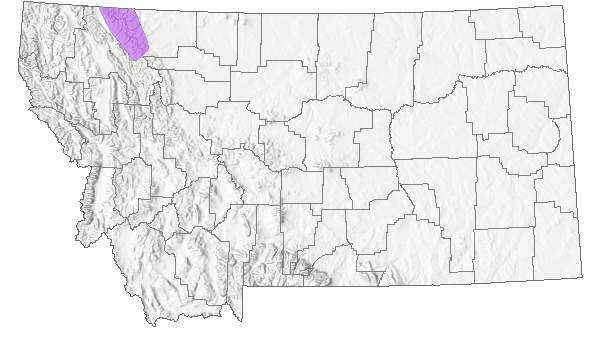
 Native
Native
Range Comments
Glacier County. AK to Greenland, south to BC, MT, MI, ME (Lesica et al. 2012. Manual of Montana Vascular Plants. BRIT Press. Fort Worth, TX).
Observations in Montana Natural Heritage Program Database
Number of Observations: 5
(Click on the following maps and charts to see full sized version)
Map Help and Descriptions
Relative Density
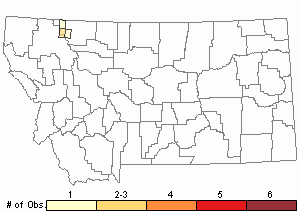
Recency
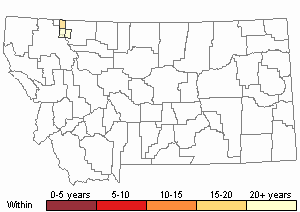

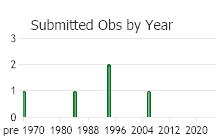
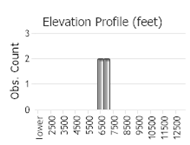 (Observations spanning multiple months or years are excluded from time charts)
(Observations spanning multiple months or years are excluded from time charts)
Habitat
Open soil in grasslands, meadows, and tundra in the alpine zone.
National Vegetation Classification System Groups Associated with this Species
Alpine
Alpine - Vegetated
Wetland and Riparian
Alpine Riparian and Wetland
Stewardship Responsibility
Threats or Limiting Factors
STATE THREAT SCORE REASON
Reported threats to Montana's populations of Arctic Eyebright include recreation-related trampling and potential risk of land use change to an agricultural purpose (MTNHP Threat Assessment 2021). Most populations occur in Glacier National Park, where one population is likely extirpated due to concentrated foot traffic, and other populations remain in unrestricted areas. One population, only known from historical herbarium records, is located on private land where land-use change to agriculture fields is a concern. Information on the existing conditions of Arctic Eyebright populations, and the scope, severity, and/or timing of are necessary to assess a relative risk from impacts.
References
- Literature Cited AboveLegend:
 View Online Publication
View Online Publication Lesica, P., M.T. Lavin, and P.F. Stickney. 2012. Manual of Montana Vascular Plants. Fort Worth, TX: BRIT Press. viii + 771 p.
Lesica, P., M.T. Lavin, and P.F. Stickney. 2012. Manual of Montana Vascular Plants. Fort Worth, TX: BRIT Press. viii + 771 p. MTNHP Threat Assessment. 2021. State Threat Score Assignment and Assessment of Reported Threats from 2006 to 2021 for State-listed Vascular Plants. Botany Program, Montana Natural Heritage Program, Helena, Montana.
MTNHP Threat Assessment. 2021. State Threat Score Assignment and Assessment of Reported Threats from 2006 to 2021 for State-listed Vascular Plants. Botany Program, Montana Natural Heritage Program, Helena, Montana.
- Additional ReferencesLegend:
 View Online Publication
View Online Publication
Do you know of a citation we're missing? Lesica, P. and B. McCune. 1992. Monitoring the effects of global warming using peripheral rare plants in wet alpine tundra in Glacier National Park, Montana. Unpublished report to Glacier National Park, Research Division, West Glacier, Montana 59936. 55pp.
Lesica, P. and B. McCune. 1992. Monitoring the effects of global warming using peripheral rare plants in wet alpine tundra in Glacier National Park, Montana. Unpublished report to Glacier National Park, Research Division, West Glacier, Montana 59936. 55pp. Lesica, P., M.T. Lavin, and P.F. Stickney. 2022. Manual of Montana Vascular Plants, Second Edition. Fort Worth, TX: BRIT Press. viii + 779 p.
Lesica, P., M.T. Lavin, and P.F. Stickney. 2022. Manual of Montana Vascular Plants, Second Edition. Fort Worth, TX: BRIT Press. viii + 779 p.
- Web Search Engines for Articles on "Arctic Eyebright"





